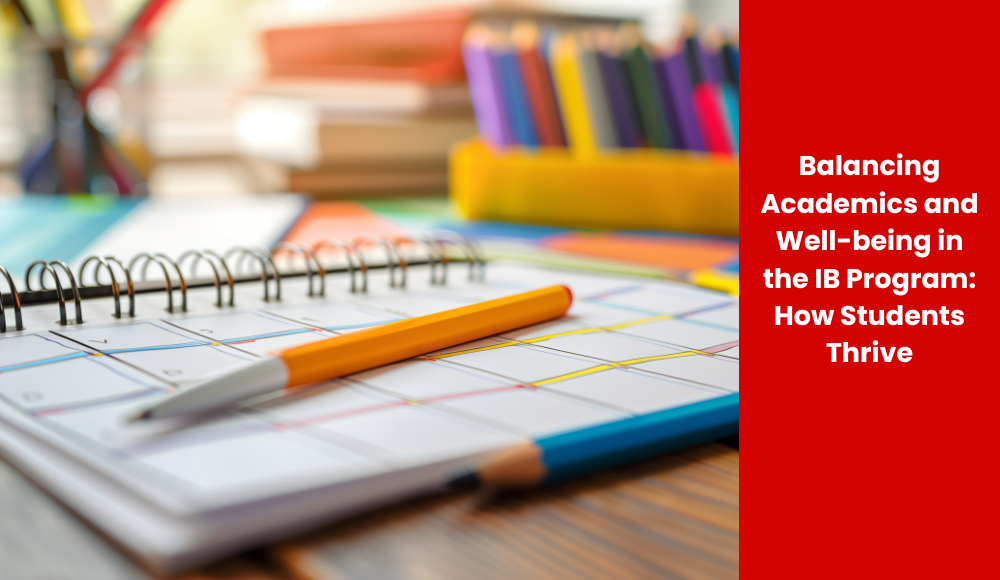Balancing Academics and Well-being in the IB Program: How Students Thrive
Introduction
Education is no longer just about grades or academic output — increasingly, schools and educators emphasize that how a student learns, grows, and develops emotionally or socially is just as important as what they learn. For students enrolled in the International Baccalaureate (IB) program, this holistic philosophy is often at the core of their schooling experience. The rigorous academic expectations, projects, deadlines, and high standards can be daunting, but when balanced with proper well‑being support, IB students can not only survive — but truly thrive.
In this article, we’ll explore why well‑being matters in IB, how IB schools integrate it, the challenges students face, and practical strategies for students (and parents/teachers) to maintain a healthy balance between academics and overall wellness.
Why Well‑Being Matters in Education — Especially in IB
The research backing well‑being and learning
There’s growing recognition across global education research that well‑being is foundational to learning. According to research compiled by IB’s own “Well‑Being Research” initiative, well‑being “profoundly influences our ability to learn, thrive and lead fulfilling lives.”
Rather than treating well‑being as an optional “extra,” contemporary education frameworks position it as integral — not incidental. A policy brief titled “What is well‑being?” describes well‑being in terms of positive emotions, resilience, self‑regulation, growth mindset, healthy routines, relationships, purpose — all of which support not just academic performance, but long-term life success.
The holistic philosophy of IB
The IB isn’t just about academics — it aims to nurture well‑rounded individuals. As per the official benefits of IB education, students don’t only build academic and research skills, but also social and emotional strengths: communication, critical thinking, global awareness, and the ability to take ownership of their learning.
Moreover, one of the core values embedded in parts of the IB curriculum — especially in early years (PYP) — is “balanced,” explicitly stressing intellectual, physical, and emotional balance.
Thus, well‑being aligns with IB’s identity: preparing students not just for exams and universities, but for life.
How IB Programs & Schools Support Well‑Being
Many IB schools globally — and also institutions in India — have realized the importance of integrating well‑being into everyday school life. Here are some of the most effective practices.
1. Embedding Well‑Being in Curriculum & School Culture
-
Curriculum structure: The IB continuum (PYP → MYP → Diploma Programme/DP) is designed to combine subject knowledge, inquiry‑based learning, creativity, and real‑life contextual learning. This reduces rote‑learning pressure and emphasizes understanding, curiosity, and personal growth.
-
Core components like Creativity, Activity, Service (CAS): In the IB Diploma Programme, CAS acts as a “counterbalance” to rigorous academics. It encourages students to engage in creative arts, sports/activity, community service — offering a break from academic pressures and building broader skills.
-
Holistic teaching and learning philosophy: Some IB schools explicitly adopt a holistic education approach — focusing not just on intellectual growth, but on emotional, social, and physical development, nurturing empathy, resilience, and a sense of purpose.
2. Mental‑Health & Wellness Support — Counseling, Self‑Care, Reflection
-
Counseling and emotional support: Schools often provide access to trained counsellors or mentors who can support students dealing with stress, burnout, or emotional challenges. This helps them navigate intense periods such as exam seasons, deadlines, or heavy workloads.
-
Teaching stress‑management & mindfulness: Many IB schools teach mindfulness, breathing exercises, relaxation techniques, or encourage self‑care practices to help students regulate emotions, manage anxiety, and maintain mental balance.
-
Promoting healthy lifestyle habits: Regular physical activity, sports, healthy sleep, and balanced routines are encouraged — acknowledging that physical health strongly affects mental well‑being.
3. Time Management, Planning & Balanced Schedules
Because IB demands academic rigor alongside extracurriculars and CAS commitments, effective time management becomes essential. Schools and students have found success with:
-
Planning tools and realistic scheduling: Using planners, calendars, or digital tools to schedule assignments, study sessions, extracurriculars, and rest — avoiding last‑minute panic.
-
Prioritizing and setting realistic goals: Recognizing that overcommitment leads to burnout — focusing on a few meaningful activities rather than trying to do everything.
-
Quality over quantity: Instead of doing many activities shallowly, concentrating energy on fewer tasks with more depth helps maintain focus and reduce stress.
These practices — when consistently applied — help students maintain balance, avoid burnout, and enjoy school life.
Challenges & Potential Pitfalls
Of course, even with the best frameworks, balancing academics and well‑being in IB isn’t always smooth. Some challenges:
-
High academic workload & expectations: The rigor and breadth of IB — multiple subjects, internal assessments, projects like Extended Essay, CAS, extracurriculars — can become overwhelming. Research literature notes that stress and extra demands are common criticisms.
-
Risk of burnout or mental‑health issues: Without proper support or self‑management, students might struggle with anxiety, fatigue, or emotional distress, especially during exam periods.
-
Balance is context‑sensitive: What works for one student may not work for another — over-commitment to extracurriculars, or poor time management, can tilt the balance unfavorably.
-
Implementation gap in some schools: While many IB schools emphasize well‑being, not all may have robust counseling, mental‑health programs, or staff trained to handle emotional or social challenges.
Thus, achieving balance requires conscious effort — from institutions, teachers, parents, and students themselves.
Practical Strategies for Students (and Parents / Teachers) to Thrive
If you are an IB student — or parent/teacher of one — here are concrete strategies to help balance academics and well‑being:
-
Use a planner (digital or paper) to map out tasks, deadlines, extracurriculars, and rest time. Block time for study and downtime. This helps avoid overload and gives clarity.
-
Prioritize: Focus on what matters — academically and personally. Decide which subjects, projects, or activities are most important; learn to say “no” when there are too many commitments.
-
Schedule regular self‑care: rest, hobbies, physical activity. Include sports, walks, creative arts, meditation — whatever helps you decompress and recharge.
-
Use downtime to reflect: journaling, mindfulness, talking to friends/mentors. Reflection helps manage emotions, build resilience, and keep perspective.
-
Seek support when needed: counselling, peer support, open communication with teachers/parents. Don’t hesitate to reach out if feeling overwhelmed.
-
Embrace a growth mindset — focus on learning, not just grades. Accept mistakes and stress as part of growth, not as failures.
-
Balance depth over breadth — quality over sheer quantity. It’s better to do fewer things well (say, fewer CAS activities, or fewer extracurriculars) than spread yourself too thin across many.
In many IB schools, communities (teachers, peers, parents) can and do encourage this balanced approach — but the responsibility also lies with the individual student to be mindful, proactive, and intentional about well‑being.
Why This Balance Matters — Beyond School
The value of balancing academics with well‑being goes far beyond school years:
-
Students build emotional resilience, self‑awareness, time-management, and healthy habits — which serve them in university, professional life, and personal well‑being.
-
The holistic education approach of IB helps cultivate global-minded, empathetic, and balanced individuals capable of handling pressure, diversity, and real-world complexity.
-
Students learn that success isn’t just high marks or a diploma — but long-term well‑being, personal growth, and readiness for life.
Conclusion
The IB program — with its rigorous academics, global outlook, and emphasis on holistic development — offers more than just knowledge. It offers a framework where academic excellence and personal well-being can coexist. Yes, the demands are real, and stress is part of the journey. But when schools like K.R. Mangalam Global School, GK-1, students, parents, and teachers acknowledge well-being as essential — and build support systems, healthy habits, and self-awareness — IB students don’t just “get through” — they flourish.
For any student considering or currently enrolled in IB: approaching your studies with mindfulness, balance, and intention can make the difference between burnout and thriving. Because education that nurtures the mind — and also the heart — builds not just scholars, but empowered global citizens ready for life.

